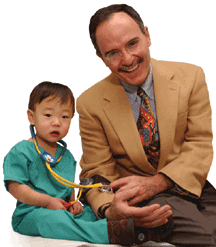Denis D. Bensard, MD
Trauma Director
with one-year-old Kyle
 Trauma Program
Trauma Program
The Trauma Program at The Children’s Hospital is a multidisciplinary program supported by pediatric surgery, neurosurgery, orthopaedic surgery, burn program, critical care, emergency medicine and numerous other medical specialties. It is the only Level I Regional Pediatric Trauma Center in the Rocky Mountain region. Under the leadership of Trauma Director Denis D. Bensard, MD, and Associate Director F. Keith Battan, MD, the program continues to grow. Since 2000, the number of patients admitted through the trauma program has increased 19 percent.
Despite the double-digit growth in admissions through Trauma, Children’s is the only major metro Denver hospital able to complete 2002 without ambulance divert hours. The elimination of divert
was accomplished through additional staffing; the opening of a new pediatric intensive care unit that doubled the number of available beds; and innovative partnerships with other hospital services and departments.
Trauma medicine is constrained by geography. Nevertheless, the Trauma Program treated pediatric patients from seven western states, including Colorado, Kansas, Montana, Nebraska, New Mexico, South Dakota and Wyoming. Additionally, trauma physicians consult on pediatric emergency cases across the country.
Because The Children’s Hospital is a designated Level I pediatric trauma center, about 70 percent of trauma patients are transferred from other hospitals and clinics. The remaining 30 percent are transported directly by ambulance from the scene of their injury.
Safety and Prevention
Through the Kiwanis Pediatric Trauma Institute, we partner with such organizations as the Denver Metro SAFE KIDS Coalition and various car seat safety programs, to provide injury prevention education for children and their families, community groups, sports organizations, schools and rural cities and towns.
The Kempe Child Protection Team provides expert assessment, evaluation and consultation when a concern about non-accidental trauma (NAT or child abuse) arises.
Education and Research
The Trauma Program offers a wide range of educational outreach. Trauma program staff regularly teach such classes as Pediatric Advanced Life Support (PALS), and Pediatric Education for Prehospital Providers (PEPP), as well as presenting a two-day pediatric trauma conference each year. Seminars and lectures eligible for physician continuing medical education (CME) credits are
routinely available.
As part of emergency services, a part-time position was created to coordinate and expand emergency medical service provider education.
The Children’s Hospital trauma physicians present to national and international conferences on such topics as “The initial evaluation of the injured child,” “Is hypotension a reliable indicator of blood loss from traumatic injury in children?”and “Advanced pediatric trauma team activation and its effect on patient hospital course and ultimate outcome.”
Kiwanis Pediatric Treatment Institute
The Kiwanis Pediatric Trauma Institute (KPTI) is a partnership between The Children’s Hospital and the Rocky Mountain District of Kiwanis dedicated to preventing traumatic injuries in children through education, outreach and research.
Community Activities
To answer the need for safety education in rural communities, The Children’s Hospital, St. Anthony’s Hospital and regional Kiwanis Clubs partnered to develop the Junglemobile program. The Junglemobile is a converted ambulance that is retrofitted as a classroom on wheels. It travels throughout rural areas of Colorado, Wyoming, and western Nebraska providing effective, “fun” injury prevention education to preschool and elementary school-aged kids. Kids learn important safety messages through interactive lessons, computer games and activity books. The educational curriculum includes lessons in child passenger/seat belt safety, dialing 911, pedestrian safety, water safety, fall prevention, bike and helmet safety, and fire safety. In the past two years, the Junglemobile has visited more than 50 rural communities. Almost 24,000 kids have taken a “safety safari.”
Child Passenger Safety is a program providing educational support and car seats to families in need. Since its inauguration in 2000, the CPS initiative has provided car and booster seats to more than 400 families, educated 308 advocates about the importance of child restraints in vehicles and presented numerous child-restraint educational classes at the community level. Staff presentations at local, state and national conferences have led to the program’s becoming a model for other health care facilities.
Denver Metro SAFE KIDS Coalition is a united effort to prevent injuries among children ages 14 years and younger. The Children’s Hospital is the lead organization in this active group of 50 metro-area agencies. The coalition has sponsored 32 grant-funded car seat check-up events and provided 775 car seats to families in need. Other successes include the distribution of nearly 3,500 free bike helmets. In 2002, The Children’s Hospital partnered with the coalition to secure passage of improved child passenger safety legislation in Colorado. The new law mandates use of booster seats for children under 55 inches and six years of age.
Outreach Programs
KPTI staff members serve on the planning committees of the Colorado Safety and Prevention Conference, the Rocky Mountain Trauma and Emergency Medicine Conference, the O’Neil Conference for nurses and the National Highway Traffic Safety Administration (NHTSA) approved child passenger safety sessions.
KPTI is working in conjunction with community partners on a NHTSA grant to promote use of seatbelts and child-restraint devices among sports utility vehicle owners and passengers.
The annual Emergent Care of the Injured Child conference, co-sponsored by KPTI and The Children’s Hospital, addresses the care of the pediatric trauma patient. More than 350 emergency medical services employees, physicians, registered nurses and respiratory therapists from Colorado, Wyoming, New Mexico, Nebraska and the Dakotas have attended this outreach in the past two years.
Playground injuries and their prevention is the subject of a joint investigation by KPTI and the Emergency Department at The Children’s Hospital.
A joint investigation with the Child Advocacy Protection Team is being conducted to identify risk factors for abusive injuries. KPTI is working with the Board of Cooperative Educational Services of Ft. Lupton, Colorado to address specific prevention/intervention measures for migrant and seasonal workers.

